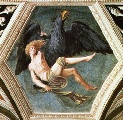|
Bel_Canto posted:heyo liturgi-goons, so a friend's birthday is coming up and he said that he'd really like to get a book or two of Christian thought/theology. he's a latin-rite catholic like me, though from a much more conservative background. basically i'm thinking two books, one that's maybe an all-around solid historical treatment of the subject unlikely to raise any eyebrows, and one that might be a little more out there/radical, since he's starting to explore that kind of intellectual and spiritual territory on his own. any advice from the more theologically literate? Well, for a historical account of the development of the church, the early councils, and the like (though only up to the early medieval period), Peter Brown's The Rise of Western Christendom is a classic and is really quite good.
|
|
|
|

|
| # ? Jun 9, 2024 06:29 |
|
Speaking as an Evangelical (even if I'm currently attending a Lutheran church), the last few pages have been utterly incomprehensible to me. The SBC's stance on the Trinity is "God, Jesus, Holy Spirit, but it honestly doesn't matter much, focus on the parts of the Bible applicable to people today."
|
|
|
|
Cythereal posted:Speaking as an Evangelical (even if I'm currently attending a Lutheran church), the last few pages have been utterly incomprehensible to me. The SBC's stance on the Trinity is "God, Jesus, Holy Spirit, but it honestly doesn't matter much, focus on the parts of the Bible applicable to people today." I'm an Anglican and TEC's position is barely comprehensible to me, as it is barely comprehensible to the majority of the Anglican Communion and the reason their communion is impaired with a majority of Anglicans. There's all kinds of insanity going on, but when you get down to it, pretty much all Christian denominations and traditions these days have their own special brand of crazy. I mean they'd have to for goons to join them.
|
|
|
|
Bel_Canto posted:heyo liturgi-goons, so a friend's birthday is coming up and he said that he'd really like to get a book or two of Christian thought/theology. he's a latin-rite catholic like me, though from a much more conservative background. basically i'm thinking two books, one that's maybe an all-around solid historical treatment of the subject unlikely to raise any eyebrows, and one that might be a little more out there/radical, since he's starting to explore that kind of intellectual and spiritual territory on his own. any advice from the more theologically literate? I dunno, if you gave him a book by like, Marcus Borg, do you think he'd be totally turned off?
|
|
|
|
kirkegaard 
|
|
|
|
You can never go wrong with Thomas Aquinas Summa Theologica for a conservative Latin-Rite Catholic. It was a compendium of all of the main theological teachings of the Catholic Church.
|
|
|
|
AmyL posted:You can never go wrong with Thomas Aquinas Summa Theologica for a conservative Latin-Rite Catholic. It was a compendium of all of the main theological teachings of the Catholic Church. Sort of. We look back on it like that, but at the time of its publication it caused a stir and was seen as controversial. I think it's important to keep that in mind along with current theological developments and trends, as some of them may come to be seen as status quo as well.
|
|
|
|
Thirteen Orphans posted:Sort of. We look back on it like that, but at the time of its publication it caused a stir and was seen as controversial. I think it's important to keep that in mind along with current theological developments and trends, as some of them may come to be seen as status quo as well. I agree but I figure that someone else in the thread will suggest something to balance it out which is why I suggested only one. Catechism of the Catholic Church or Catholic Christianity?
|
|
|
|
CCC is a good suggestion.
|
|
|
|
Mr. Wiggles posted:CCC is a good suggestion. possibly too close to the modern hierarchy, depending on what kind of trad he is
|
|
|
|
HEY GAL posted:possibly too close to the modern hierarchy, depending on what kind of trad he is the kind where he's had a copy of the CCC since grade school. he's interested more in academic theology, not official teaching documents.
|
|
|
|
hans urs von balthasar
|
|
|
|
Tielhard de Chardin. Or Origen.
|
|
|
|
Gilson, son. History of Christian Philosophy is pretty good if your friend is into academic stuff.
|
|
|
|
Karl Rahner 
|
|
|
|
i don't know if he wrote any straight theology, but dietrich bonhoeffer is always a cool dude p.s. i couldnt remember his name so i just typed "priest who tried to kill hitler" into google
|
|
|
|
On the Incarnation I guess
|
|
|
|
Bonhoeffer is a fantastic theologian, and very good on Christology. He's got a lot of similarities with Barth, including that he can be extremely dry. But The Cost of Discipleship is readable and good, and dovetails very well with the own details of his life and death, and would make an excellent present.
|
|
|
|
I hadn't heard of Bonhoeffer before today, and it's fascinating to hear a Christian talk about living morally in circumstances where God and faith are inaccessible, or where people don't have the necessary capacity to believe, or even (although I'm sure I don't have the background to parse how literal he's being) where God might as well not exist at all. On a related note, I've been reading the Catechism -- I'm an atheist, but I have a close friend who's Catholic and it's important to me to understand the faith's significance to her -- and it's raised some questions for me. I was impressed (though not surprised) to see how many of my objections as a non-believer were pre-emptively addressed, even if the majority of the answers wind back around to faith itself sooner or later. I expect my objections are pretty mundane, so my questions are about faith itself -- if I understand correctly, faith is a supernatural gift from God which allows human beings to believe beyond the bounds of reason (although it doesn't conflict with reason, and the two can even support each other), no one is wholly exempt from, immune to, or incapable of faith, but at the same time it can't arise out of nothing -- there was a particularly striking part about how no one can come to it alone, that you need other people and tradition to get there. Have I made any errors there? And, assuming I haven't, what is the basis -- whether scriptural, or the history of which council it was decided at, anything at all -- of the claim that no one is incapable of faith? I'm peripherally aware of some heresies that claim otherwise (I went on a Valentinian/Gnostic religious poetry kick a while back) so it sounds like there was once some room for argument, even if there isn't now. I'm especially curious if Catholic teaching says anything about the proper course of action and way of living for someone who has never experienced faith.
|
|
|
|
Tuxedo Catfish posted:I hadn't heard of Bonhoeffer before today, and it's fascinating to hear a Christian talk about living morally in circumstances where God and faith are inaccessible, or where people don't have the necessary capacity to believe, or even (although I'm sure I don't have the background to parse how literal he's being) where God might as well not exist at all. That seems mostly about right, though the non-Catholics in the thread may have some issues on the notion of faith. The basis is really Paul's letters, particularly those to the Romans and the Corinthians. The claim is popular in academic circles and does have some merit, that it is with Christianity and particularly with Paul that the notion of universalism comes into currency. Ancient pagans were perfectly capable of being cosmopolitan, of course, but that was more about tolerating difference, and it was pretty much given to them that people were different according to their particular ethnoi (something like ethnicity, but that doesn't quite line up with our modern notion) and social station. The apologists and then Eusebius carry the line further - Christians are the triton genos, the "third race," neither Jew nor Gentile, neither Greek nor Barbarian; whether you're Christian or not is supposed to trump all other determinations and anyone can become Christian. Of course, there is some pushback against this idea centuries later, during European colonization; if the natives are capable of faith, you're kinda obligated to try to convert them; the argument sometimes is posed that they're not, so that the Europeans can go straight to the killing.
|
|
|
|
Tuxedo Catfish posted:
Faith can conflict with reason--it is seen as above reason, as in faith in the mystery of the trinity superseding the non-logic of the trinity. And you don't need other people, faith can be given just by the divine.
|
|
|
|
Obdicut posted:Faith can conflict with reason--it is seen as above reason, as in faith in the mystery of the trinity superseding the non-logic of the trinity. And you don't need other people, faith can be given just by the divine. Maybe I misunderstood or over-generalized something explaining the need to spread specific articles of the faith (like Christ's divinity to people who'd never even heard of him, or what have you) as being about the experience itself. Either way, thank you both for your responses.
|
|
|
|
Tuxedo Catfish posted:Maybe I misunderstood or over-generalized something explaining the need to spread specific articles of the faith (like Christ's divinity to people who'd never even heard of him, or what have you) as being about the experience itself. Either way, thank you both for your responses. Yeah, the faith of an uncontacted Amazonian tribesperson is going to be very different, but at the heart of it faith is accepting or submitting to whatever god has revealed to you, through whatever form. if it's through scripture that you've heard, that's cool, but even a dude in the middle of nowhere will, according to Catholic theology, have had some sign or contact from God and will be able to display faith in that way. It's going to be a much more abbreviated form of faith, though.
|
|
|
|
Is this the passage you were talking about?:The Catechism of the Catholic Church posted:166 Faith is a personal act—the free response of the human person to the initiative of God who reveals himself. But faith is not an isolated act. No one can believe alone, just as no one can live alone. You have not given yourself faith as you have not given yourself life. The believer has received faith from others and should hand it on to others. Our love for Jesus and for our neighbor impels us to speak to others about our faith. Each believer is thus a link in the great chain of believers. I cannot believe without being carried by the faith of others, and by my faith I help support others in the faith. Does that help?
|
|
|
|
It does; that's exactly the one I was thinking of.
|
|
|
|
HEY GAL posted:hans urs von balthasar You go Balthasar but no Yves M.J. Congar?
|
|
|
|
Tuxedo Catfish posted:It does; that's exactly the one I was thinking of. I'll add that it looks like that passage is not describing the idea of faith as a concept, but rather the act of a human acting upon what Christians consider a gift from God. This is where it gets tricky, since Christians differ upon the nature of this gift, how it is offered, and how it is accepted. More importantly for you, it doesn't actually address the question "what is faith", where the word "faith" is a noun (the catechism excerpt looks like it's using it as a verb). And even if it was discussing faith in terms of an abstract concept, this is one of those topics where there is likely to be a diversity of opinion within the Catholic Church (or any other intellectual denomination), simply due to the fact that theology is not usually expressed in terms of (say) mathematical proof, so there is a lot left over to argue and meditate about. Lutha Mahtin fucked around with this message at 04:53 on Jul 23, 2015 |
|
|
|
So basically just fake it until you make it? I can see that working. Accepting the supernatual elements of the faith is where i struggle. I agree With the ethics and i am fascinated by the theology and the history. But do i really really genuinly feel like the miracles described in the OT and NT actually happened? For the moment i am unable to convice myself that these events really took place. And like Paul said. What is our faith if Christ did not actually rise?
|
|
|
|
Baudolino posted:And like Paul said. What is our faith if Christ did not actually rise? There are a number of theologians, including some Catholic clergy, who would argue that Christ rising is his Resurrection and that this can be mutually exclusive to his resuscitation. Some of these theologians argue that the Resurrection, Christ's rising from the dead, was a religio-spiritual event in the community of believers. (The Gospel's themselves make mention that the risen Christ was seen by believers.) They would argue that this experience of a Christ as still present in the community, even after his embarrassing death, is his rising. A corpse, so the argument goes, does not stop the Risen Christ from being with and in the community of the faithful. I do not [technically] align with this mode of thinking, but it is demonstrative that a person with more "realistic" sensibilities can still participate in the life of faith. Edit: I forgot the context in which your post was made, the discussion of faith as a concept in itself. Forgive my myopic response to your post.
|
|
|
|
From my experience as a more conservative Latin rite Catholic: GK Chesterton The Everlasting Man St Augustine's Confessions Dom Marmion Christ the Life of the Soul And if you have $Texas to spend, Dom Gueranger the Liturgical Year [15 vol]
|
|
|
|
Baudolino posted:So basically just fake it until you make it? I can see that working. Contrary to Thirteen Orphans' post above, I do think that if Christ was not literally bodily raised from the dead - "resuscitated", as the sort of theologians he meant would dismissively put it - then Christianity is indeed nonsense. But I don't think you have to have had an emotional experience, or feel some sort of confident certainty, to accept that those events really took place; it's possible to come to a belief in a single omnipotent deity through reason alone, according to the Catholic Church, and if one already believes that a god exists, the miracles of the NT, at least, aren't impossible. If belief in a god is rational, and the miracles aren't impossible, perhaps one could instead try to convince oneself that the Church is trustworthy (however you interpret capital-C Church), and that thus the gospels are trustworthy too.
|
|
|
|
Thirteen Orphans posted:There are a number of theologians, including some Catholic clergy, who would argue that Christ rising is his Resurrection and that this can be mutually exclusive to his resuscitation. Some of these theologians argue that the Resurrection, Christ's rising from the dead, was a religio-spiritual event in the community of believers. (The Gospel's themselves make mention that the risen Christ was seen by believers.) They would argue that this experience of a Christ as still present in the community, even after his embarrassing death, is his rising. A corpse, so the argument goes, does not stop the Risen Christ from being with and in the community of the faithful. This is my belief, more or less. Jesus's body got eaten by Jerusalem's feral dogs, but Christ (after 36 or so hours tearing around the afterlife, dissing death and slapping demons) appeared to his disciples. I lean towards this appearance being more spiritual than physical, but he's god he can do both or neither or whatever he likes best.
|
|
|
|
I've always liked Chesterton's line that "I believe in miracles and I believe in man-eating tigers and I expect to see neither walking through the streets of London."
|
|
|
|
Baudolino posted:So basically just fake it until you make it? I can see that working. the resurrection is not a physics equation. the bible was codified into its current form like a millenium before Francis Bacon invented the modern scientific method. do you get what I'm going for here? Lutha Mahtin fucked around with this message at 07:57 on Jul 27, 2015 |
|
|
|
StashAugustine posted:I've always liked Chesterton's line that "I believe in miracles and I believe in man-eating tigers and I expect to see neither walking through the streets of London." Would be handy, though. In both of those cases (London has had it too good for far too long). Lutha Mahtin posted:the resurrection is not a physics equation. the bible was codified into its current form like a millenium before Francis Bacon invented the modern scientific method. do you get what I'm going for here? I don't think I follow.
|
|
|
|
JcDent posted:I don't think I follow. none of the authors of the texts in the bible could have possibly intended their work to be interpreted according to our modern scientific method, because the modern scientific method has only been around for about five hundred years. thus, to interpret an event described in the bible literally and through a modern scientific lens, is to scrutinize a writer for something they would never have thought to account for in their work
|
|
|
|
Just to make it super clear in case the Bishop finds out my SA name, I in no way think those theologians are correct, just that they exist and have a genuine faith journey they are exploring as well.
|
|
|
|
Lutha Mahtin posted:none of the authors of the texts in the bible could have possibly intended their work to be interpreted according to our modern scientific method, because the modern scientific method has only been around for about five hundred years. thus, to interpret an event described in the bible literally and through a modern scientific lens, is to scrutinize a writer for something they would never have thought to account for in their work I don't think the scientific method per se is relevant. It is not like they had no understanding of the physical world. Thomas putting his fingers in Christ's side, for example, suggests to me that the Resurrection had a clear physical component, in addition to the obvious metaphysical one.
|
|
|
|
Thirteen Orphans posted:Just to make it super clear in case the Bishop finds out my SA name, I in no way think those theologians are correct, just that they exist and have a genuine faith journey they are exploring as well. Too late I've reported you to the Swiss Guard and Vatican Karate Gorillas have been dispatched to your location. You will pay for beliefs, witch!
|
|
|
|

|
| # ? Jun 9, 2024 06:29 |
|
Black Bones posted:Too late I've reported you to the Swiss Guard and Vatican Karate Gorillas have been dispatched to your location. You will pay for beliefs, witch! I'll be ok, I've got names I'm willing to name.
|
|
|






























